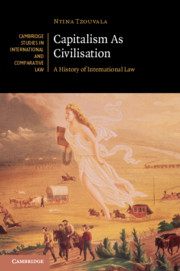Book contents
- Capitalism As Civilisation
- Cambridge Studies in International and Comparative Law: 142
- Capitalism As Civilisation
- Copyright page
- Contents
- Acknowledgements
- 1 The Standard of Civilisation in International Law
- 2 The Standard of Civilisation in the Nineteenth Century
- 3 The Institutionalisation of Civilisation in the Interwar Period
- 4 Arguing with Borrowed Concepts
- 5 From Iraq to Syria
- 6 Thinking through Contradictions on a Warming Planet
- Bibliography
- Index
- Cambridge Studies in International and Comparative Law
4 - Arguing with Borrowed Concepts
‘The Sacred Trust of Civilisation’ in the South West Africa Saga
Published online by Cambridge University Press: 22 October 2020
- Capitalism As Civilisation
- Cambridge Studies in International and Comparative Law: 142
- Capitalism As Civilisation
- Copyright page
- Contents
- Acknowledgements
- 1 The Standard of Civilisation in International Law
- 2 The Standard of Civilisation in the Nineteenth Century
- 3 The Institutionalisation of Civilisation in the Interwar Period
- 4 Arguing with Borrowed Concepts
- 5 From Iraq to Syria
- 6 Thinking through Contradictions on a Warming Planet
- Bibliography
- Index
- Cambridge Studies in International and Comparative Law
Summary
The end of the Second World War and the establishment of the United Nations did not signal the end of ‘civilisation’. In fact, one of the most famous and prolonged legal battles of the Cold War period, the South West Africa saga, was fought over the the justiciability and content of the ‘sacred trust of civilisation’. This chapter offers a close reading of a wide range of materials regarding the clash between critics and supporters of apartheid in front of the International Court of Justice. In so doing, it maps the gradual domestication of the Applicants’ case from a detailed exposition of racial capitalism in Namibia to a narrow condemnation of apartheid as being discriminatory against ‘exceptional’ black individuals. Finally, by detailing the process that led to Namibia’s independence, the chapter shows the heavy influence of international law and international actors in safeguarding the interests of white settlers and transnational capital in the country through the usage of constitutional law and human rights.
Keywords
- Type
- Chapter
- Information
- Capitalism As CivilisationA History of International Law, pp. 129 - 166Publisher: Cambridge University PressPrint publication year: 2020

